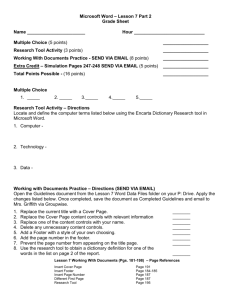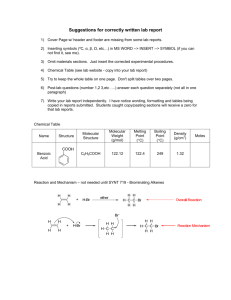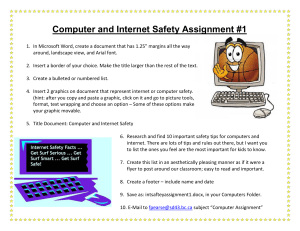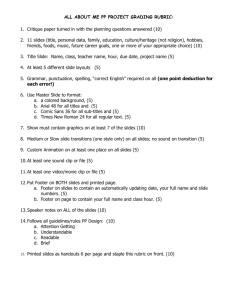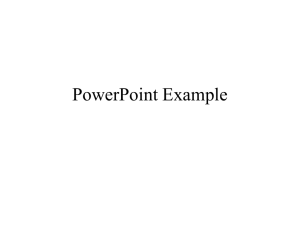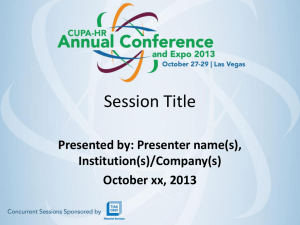A mentor is - University of Reading
advertisement
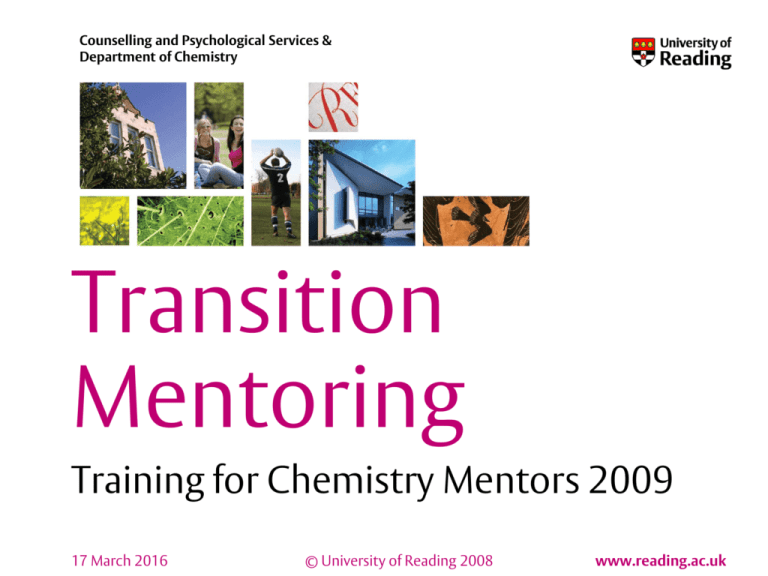
Counselling and Psychological Services & Department of Chemistry Transition Mentoring Training for Chemistry Mentors 2009 17 March 2016 © University of Reading 2008 www.reading.ac.uk What is Mentoring? • An informal relationship • A supportive relationship • A guiding relationship • Leads to the growth of both mentor and mentee Insert footer on Slide Master 2 What Mentoring isn’t • Not personal tutoring • Not psychological counselling • Not telling someone what to do • Not doing it for them Insert footer on Slide Master 3 What does the word ‘Mentor’ mean? • The word ‘Mentor’ first appears in Homer’s Odyssey • ‘Mentor’ is the name of the disguised goddess ‘Athene’ • In the role of ‘Mentor’ she acts as the guide of the young Telemachus • Etymologically ‘mentor’ means ‘guide, counsellor’ • Comes from the root ‘men-’ (as in ‘men tal’) meaning ‘remember’, ‘think’ Insert footer on Slide Master 4 So…a MENTOR is someone who… • keeps the other person in mind • thinks about what might be going on for them • ‘looks out’ for them Insert footer on Slide Master 5 What is a mentor? A mentor is A mentor isn’t • guide • guardian angel • friend • foster parent • listener • therapist • coach • probation officer • caring person • tutor Insert footer on Slide Master 6 What kind of things can a mentor help with? • Practical – Where can I buy…? Who do I ask about…? How can I …? • Social – Good ways to meet people… the cheapest pizza… the friendliest pub… • Academic – How do I write a lab report? – What’s expected for an assignment? – What’s the best way to revise for this text? Insert footer on Slide Master 7 What makes a good mentor? Discuss in pairs: • What would the characteristics of an appalling mentor be? – What would be really unhelpful in a mentor? – What sorts of things would really put you off using a mentor? Brainstorm your ideas in the whole group… Insert footer on Slide Master 8 Aims of Transition Mentoring: • Support new students to develop skills to become – – – – – independent adults independent learners comfortable about asking questions able to look for and find their own answers develop AUTONOMY Insert footer on Slide Master 9 Good Mentoring is about… • enabling students to develop new skills • NOT solving or overcoming ‘problems’ it involves: • Encouraging • Supporting • Enthusing • Avoiding the word ‘problem’ and the phrase ‘can I help?’ Insert footer on Slide Master 10 Your experience is key: YOU are the EXPERTS! YOU have done it already! Insert footer on Slide Master 11 What was it like for you? In groups of three, talk about: • What were you most worried about before you arrived? • What did you find hardest about – your first term? – Your first year? • Where were the ‘hotspots’? • What do you know now that you wish you’d known then? Insert footer on Slide Master 12 Recording a Welcome Podcast • In your groups you will be assigned a theme: – Welcome soundbites – introduce yourselves and explain your role as mentors – Things you were worried about before you arrived; what happened to your worries when you got here – What will be happening in Freshers Week – and 3 POSITIVE points about studying in the Chemistry Department – One piece of advice you would give yourself as a First Year. Close the podcast with a goodbye/see you soon message Insert footer on Slide Master 13 Part 1 support- Autumn term 1. A few weeks before Freshers’ week- email to introduce yourself 2. Freshers’ week• Wednesday- module enrolment • Friday- meet and greet quiz and chat 3. Week 2/ 3 social activity- mentors to arrange Support in terms of practical course worries 4. Week 3- first tutorial to be started and handed in in week 4. First tutorial week 5. There are key times within the calendar of a Part 1 student when they may require more support. Listed here are those times. If you can think of any more we can add them to the timeline. Insert footer on Slide Master 5. Week 6- Refreshers week- may hold study skills session 6. Week 8- begin revision for end of term test in week 10 Part 1 support- spring term 7. Beginning of Spring term- may be a difficult time for some first year students. Some might need extra support. 8. Beginning of spring term Organic chemistry test 9. Weeks 2, 3 and 4 IT skills. Coursework due in week 5 or 6 10. Week 7- Organic chemistry final lab report . due in I will send reminder emails to you all shortly before each. Please make particular effort to contact your mentees at these times. Insert footer on Slide Master 11. Week 8- begin revision for end of spring term test in week 10 12. Easter- Begin revision for end of year exams which start in week 5 of summer term Tips for writing your first email: • Make it personal and friendly • Refer to your own (recent) experience • Add something about what you are doing this year • Talk about what your favourite 1st year modules were • Or your least favourite • Mainly, try and remember what you felt like when you were in their position – What were you worried about? – How did you feel? Insert footer on Slide Master 16
